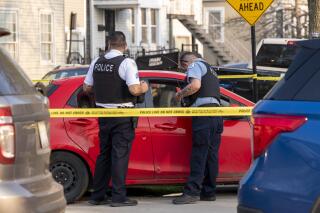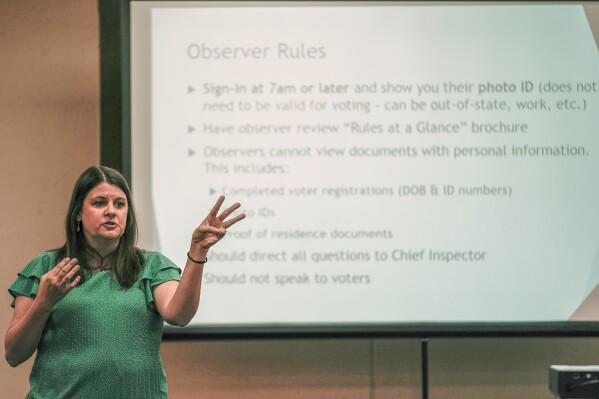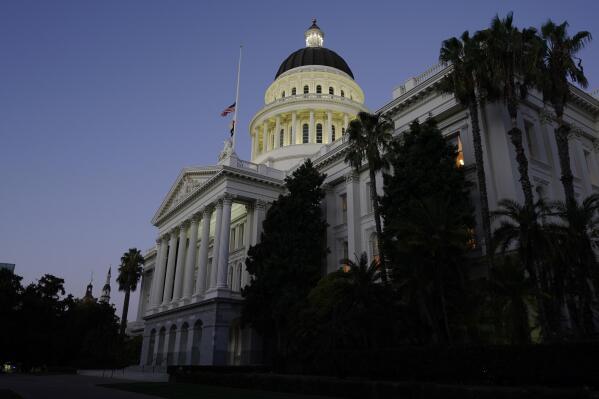Illinois will allow some non-citizens to be police. But only those authorized to work and own a gun

Chicago police officers secure a red car that crashed into a fence in the 4500 block of South Marshfield Avenue that is suspected to be related to a fatal shooting Tuesday, May 10, 2022 in Chicago. The Associated Press on Friday, Aug. 4, 2023, reported on social media posts falsely claiming that a new law in Illinois allows any immigrant living in the country illegally to become a police officer. (Tyler Pasciak LaRiviere /Chicago Sun-Times via AP)
CLAIM: A new law in Illinois allows any immigrant living in the country illegally to become a police officer.
AP’S ASSESSMENT: False. The law allows certain non-citizens to apply for police officer jobs. But they must be legally authorized to both work and carry a firearm in the country. Immigration law experts say this includes lawful permanent residents, or green card holders, as well as those in the country with permanent legal status but not yet full citizens, such as refugees and asylees. Those on Deferred Action for Childhood Arrivals, or DACA, are technically listed as eligible but they’re currently prohibited from possessing firearms.
THE FACTS: Social media users are falsely claiming a new Illinois law will allow anyone who enters the country illegally to pursue a job in law enforcement.
“Just In: Illinois Governor J.B. Pritzker has signed a law that will allow illegal immigrants to become police officers and sheriffs deputies,” wrote one Instagram user in a widely shared post. “Once this takes effect, people who are actively breaking federal law will be arresting Americans if they break the law. This madness from the democrat party is absolutely out of control.”
Prominent Republicans made similar comments on the platform formerly known as Twitter.
“No illegal alien should have authority over any American citizen,” wrote Florida Gov. Ron DeSantis. “It is a sad commentary on the state of America that this is even a debate.”
“Yes, you heard that right,” echoed U.S. Rep. Lauren Boebert, of Colorado. “People who are breaking the law by their presence here can now arrest American citizens.”
But the legislation Pritzker signed last month, which takes effect next year, clearly states that only non-citizens who have work authorization and are legally permitted to carry a firearm qualify.
“An individual who is not a citizen but is legally authorized to work in the United States under federal law is authorized to apply for the position of police officer, subject to all requirements and limitations, other than citizenship, to which other applicants are subject,” the law reads.
State Rep. Barbara Hernandez, an Aurora Democrat who sponsored the bill, HB3751, said those in the country illegally don’t qualify because they can’t legally obtain firearms. Under federal law, only U.S. citizens, lawful permanent residents and other people lawfully in the country can possess guns.
Immigrants who would likely meet the criteria of the new law include green card holders and, potentially, those granted asylum, refugee or other permanent status, said Lauren Aronson, director of the Immigration Law Clinic at the University of Illinois College of Law in Champaign.
Those on temporary status, such as foreign nationals in the country on student, tourist and employment-based visas, would not qualify, she said.
Spokespersons for DeSantis didn’t respond to an email seeking comment Friday, and Boebert, through a spokesperson, didn’t address the responses from Illinois officials.
Instead, she took issue with the fact that DACA recipients are specifically mentioned in the new law, which is similar to those approved in California, Colorado, Vermont, and Hawaii.
The immigration policy, which stays deportation for those brought into the country illegally as young children, is unconstitutional because it was never approved by Congress when it was created by former Democratic President Barack Obama, Boebert argued in an emailed statement.
Proponents of the legislation noted DACA recipients are still among those banned from owning firearms because they’re not considered lawful permanent residents. That means federal law would have to change before Illinois’ roughly 30,000 DACA recipients could apply for police officer jobs.
“Since I do not see that happening any time soon, that portion of the bill is symbolic unless their own individual department finds ways to allow them,” Hernandez wrote.
“If an individual is not authorized under federal law to obtain, carry, purchase, or possess a firearm, they cannot be hired/appointed to the law enforcement positions,” wrote Jordan Abudayyeh, Pritzker’s deputy chief of staff, in an email.
Bethany Hoffmann, vice chair of the American Immigration Lawyers Association’s Chicago chapter noted the law also explicitly makes clear that all other criteria for becoming a police officer in Illinois still apply, including being ineligible based on criminal history.
“Cities across Illinois have licensed doctors, nurses, teachers, and attorneys who are non-citizens serving their communities,” she wrote in an email. “This bill is a practical extension of a practice in effect already in other service sectors of the State.”
----
Associated Press reporter Angelo Fichera in New York contributed to this story.
___
This is part of AP’s effort to address widely shared misinformation, including work with outside companies and organizations to add factual context to misleading content that is circulating online. Learn more about fact-checking at AP.




